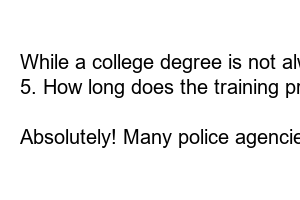경찰이 되는 방법
Title: How to Become a Police Officer: Your Ultimate Guide to Embarking on a Rewarding Law Enforcement Career
Introduction:
Are you passionate about promoting safety, protecting communities, and upholding justice? Becoming a police officer allows you to serve your community and make a positive impact on society. In this comprehensive guide, we will walk you through the step-by-step process of how to become a police officer and achieve your dream career in law enforcement.
1. Research Different Police Agencies:
Before embarking on your journey, it’s important to research and familiarize yourself with the various police agencies in your area. Find out their requirements, selection processes, and any specific qualifications they may have. This will help you tailor your preparation accordingly and increase your chances of success.
2. Meet the Basic Eligibility Criteria:
To become a police officer, you must meet certain eligibility criteria, which may vary depending on the agency. These typically include being a legal adult, holding a valid driver’s license, having a high school diploma or equivalent, and being a U.S. citizen (or permanent resident in some cases). Meeting these requirements lays the foundation for your application.
3. Educational Requirements:
Obtaining a college degree in criminal justice, criminology, or a related field can be highly advantageous when pursuing a career in law enforcement. Although it may not be mandatory for all agencies, a degree can enhance your knowledge, skills, and marketability as a potential candidate.
4. Physical Fitness and Health Requirements:
Physical fitness is a crucial aspect of law enforcement. Police officers must possess the strength, agility, and endurance necessary to perform their duties effectively. Prepare yourself physically by following a regular exercise routine and maintaining a healthy lifestyle. Some agencies also require candidates to pass medical examinations.
5. Application Process and Written Exam:
Once you have met the eligibility requirements, you can begin the application process. This typically involves submitting an application, undergoing a thorough background check, and providing any necessary documentation. In addition, you will be required to pass a written exam, which assesses your knowledge of law enforcement procedures, ethics, and relevant legislation.
6. Prepare for the Interview and Oral Board Assessment:
If you successfully clear the written exam, the next step is the interview and oral board assessment. This stage evaluates your communication skills, problem-solving abilities, and suitability for the role. Be prepared to answer questions about your motivation for joining the police force, your leadership potential, and your approach to handling challenging situations.
7. Final Stages: Background Investigation, Psychological and Physical Evaluation:
After passing the interview, you will undergo an extensive background investigation. This examination includes checks on your criminal history, employment records, personal references, credit history, and drug usage. If you successfully clear this step, you will undergo psychological and physical evaluations to ensure you are mentally and physically fit for the demanding role of a police officer.
Summary:
Becoming a police officer requires determination, dedication, and a strong sense of responsibility. By researching police agencies, meeting eligibility criteria, obtaining an education, maintaining physical fitness, and successfully navigating the application process, you can position yourself as a strong candidate. Remember, this rewarding career path is not for everyone, but if you have a genuine desire to protect and serve, it can be incredibly fulfilling.
FAQs:
1. What is the age limit to become a police officer?
Most agencies require candidates to be at least 21 years old. However, some agencies accept applications from individuals as young as 18.
2. Do I need prior military experience to become a police officer?
Prior military experience is not mandatory but can be beneficial in certain cases. It can enhance your discipline, teamwork skills, and ability to handle high-pressure situations.
3. Can I become a police officer with a criminal record?
Having a criminal record may disqualify you from becoming a police officer. However, it depends on the nature and severity of the offense, as well as the agency’s specific guidelines.
4. Is a college degree required to become a police officer?
While a college degree is not always a mandatory requirement, it can significantly enhance your prospects of becoming a police officer and advancing within the ranks.
5. How long does the training process take?
The training process typically lasts several months and encompasses both classroom instruction and practical exercises to prepare you for the challenges of the job.
6. Can women become police officers?
Absolutely! Many police agencies actively encourage women to join the force and promote gender diversity within law enforcement.

